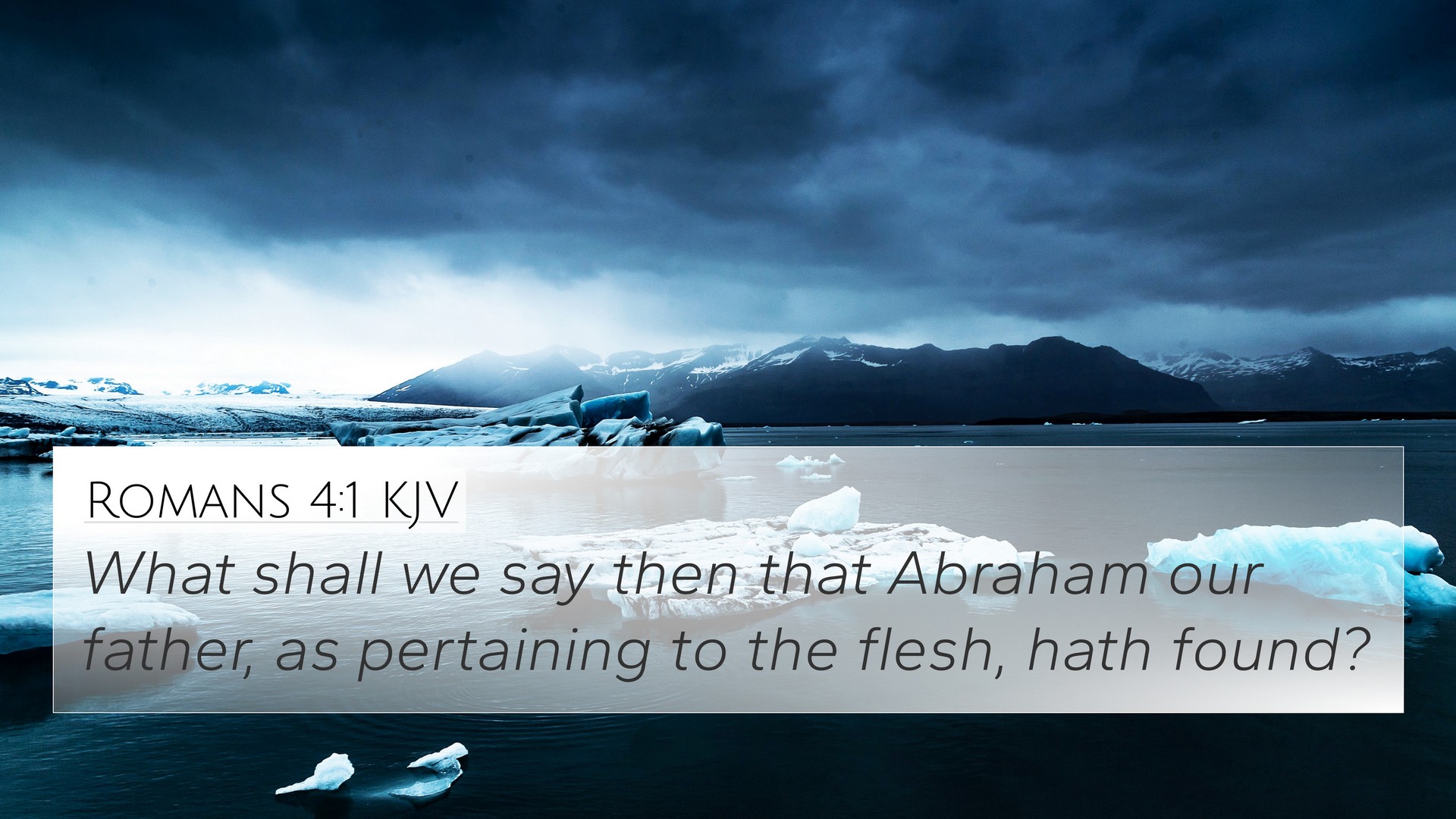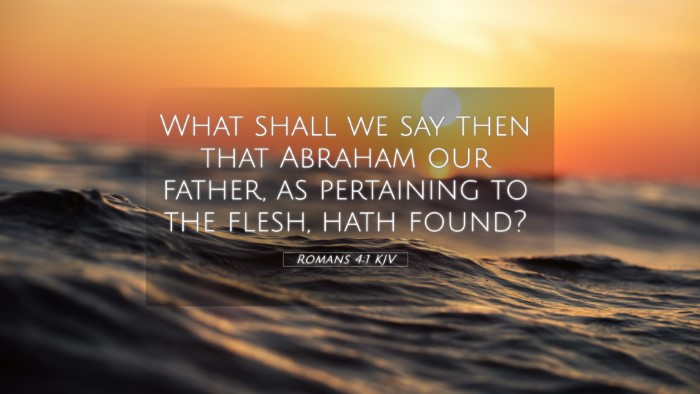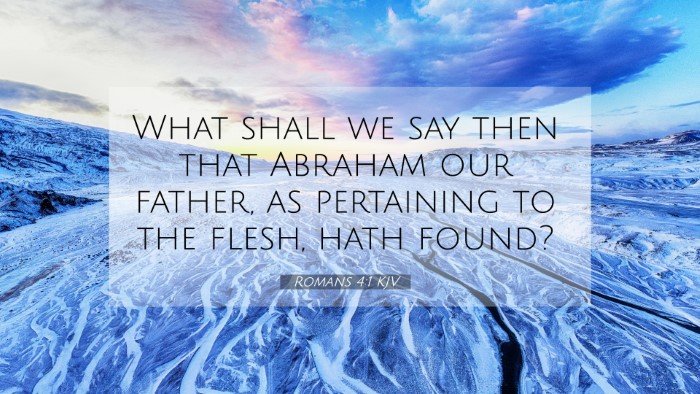Old Testament
Genesis Exodus Leviticus Numbers Deuteronomy Joshua Judges Ruth 1 Samuel 2 Samuel 1 Kings 2 Kings 1 Chronicles 2 Chronicles Ezra Nehemiah Esther Job Psalms Proverbs Ecclesiastes Song of Solomon Isaiah Jeremiah Lamentations Ezekiel Daniel Hosea Joel Amos Obadiah Jonah Micah Nahum Habakkuk Zephaniah Haggai Zechariah MalachiRomans 4:1 Similar Verses
Romans 4:1 Cross References
What shall we say then that Abraham our father, as pertaining to the flesh, hath found?
Uncover the Rich Themes and Topics of This Bible Verse
Listed below are the Bible themes associated with Romans 4:1. We invite you to explore each theme to gain deeper insights into the Scriptures.
Romans 4:1 Cross Reference Verses
This section features a detailed cross-reference designed to enrich your understanding of the Scriptures. Below, you will find carefully selected verses that echo the themes and teachings related to Romans 4:1 KJV. Click on any image to explore detailed analyses of related Bible verses and uncover deeper theological insights.
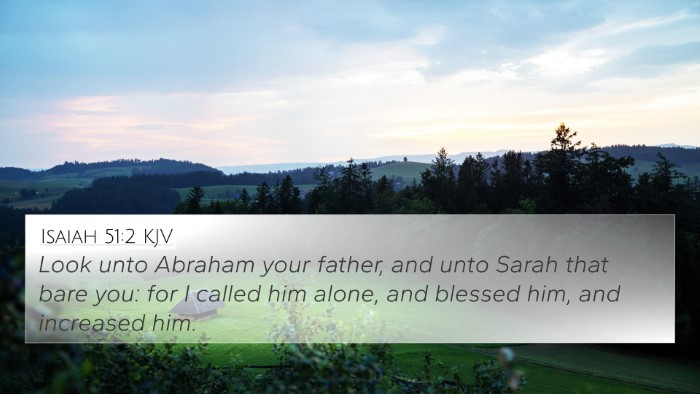
Isaiah 51:2 (KJV) »
Look unto Abraham your father, and unto Sarah that bare you: for I called him alone, and blessed him, and increased him.
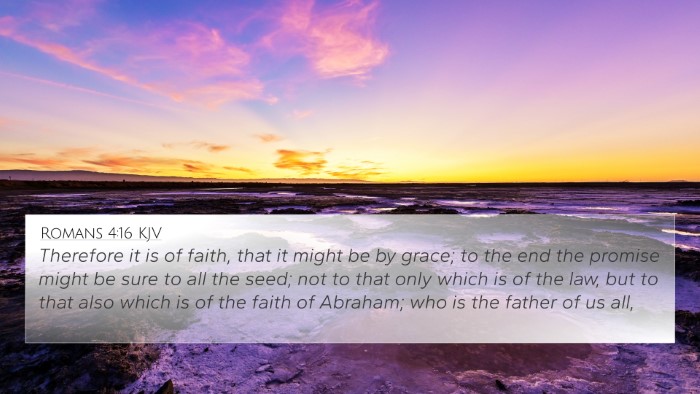
Romans 4:16 (KJV) »
Therefore it is of faith, that it might be by grace; to the end the promise might be sure to all the seed; not to that only which is of the law, but to that also which is of the faith of Abraham; who is the father of us all,
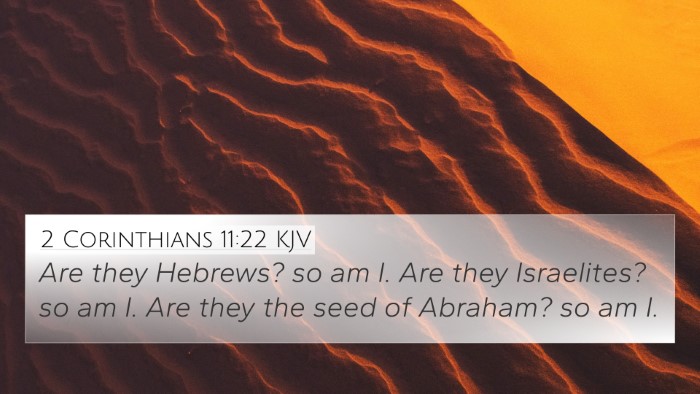
2 Corinthians 11:22 (KJV) »
Are they Hebrews? so am I. Are they Israelites? so am I. Are they the seed of Abraham? so am I.
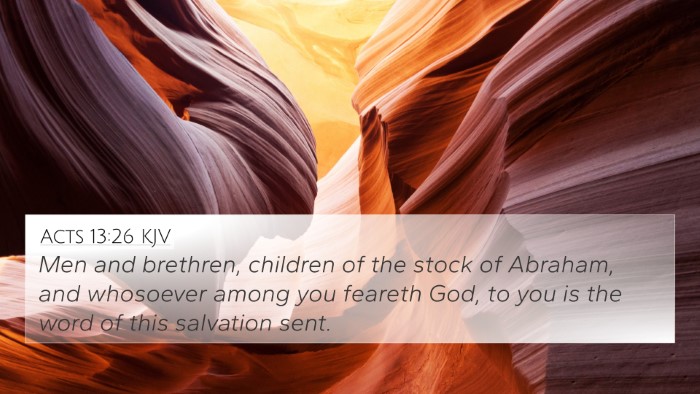
Acts 13:26 (KJV) »
Men and brethren, children of the stock of Abraham, and whosoever among you feareth God, to you is the word of this salvation sent.

Romans 8:31 (KJV) »
What shall we then say to these things? If God be for us, who can be against us?

Romans 7:7 (KJV) »
What shall we say then? Is the law sin? God forbid. Nay, I had not known sin, but by the law: for I had not known lust, except the law had said, Thou shalt not covet.

John 8:37 (KJV) »
I know that ye are Abraham's seed; but ye seek to kill me, because my word hath no place in you.

John 8:33 (KJV) »
They answered him, We be Abraham's seed, and were never in bondage to any man: how sayest thou, Ye shall be made free?
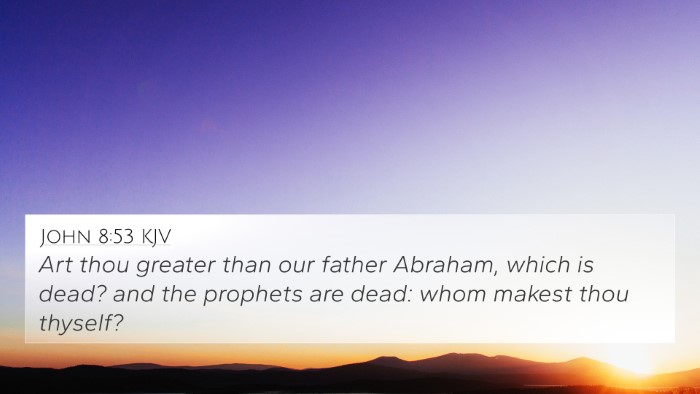
John 8:53 (KJV) »
Art thou greater than our father Abraham, which is dead? and the prophets are dead: whom makest thou thyself?
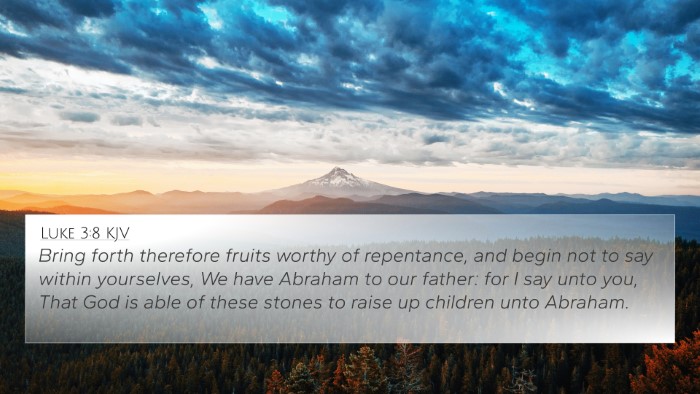
Luke 3:8 (KJV) »
Bring forth therefore fruits worthy of repentance, and begin not to say within yourselves, We have Abraham to our father: for I say unto you, That God is able of these stones to raise up children unto Abraham.
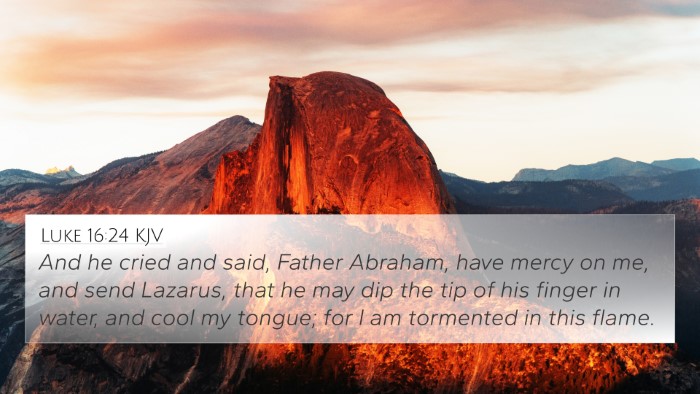
Luke 16:24 (KJV) »
And he cried and said, Father Abraham, have mercy on me, and send Lazarus, that he may dip the tip of his finger in water, and cool my tongue; for I am tormented in this flame.

Matthew 3:9 (KJV) »
And think not to say within yourselves, We have Abraham to our father: for I say unto you, that God is able of these stones to raise up children unto Abraham.
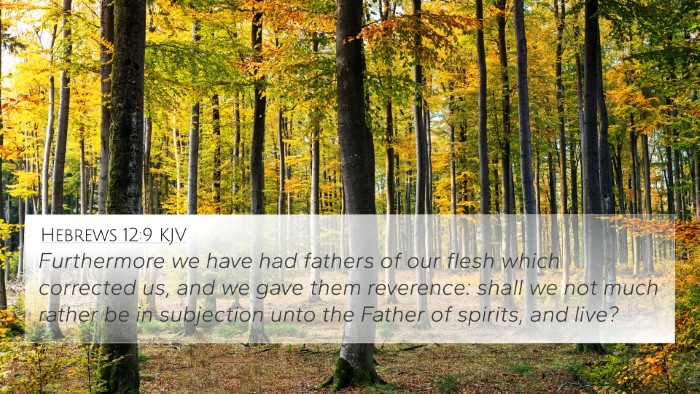
Hebrews 12:9 (KJV) »
Furthermore we have had fathers of our flesh which corrected us, and we gave them reverence: shall we not much rather be in subjection unto the Father of spirits, and live?
Romans 4:1 Verse Analysis and Similar Verses
Understanding Romans 4:1
Romans 4:1 states, "What then shall we say that Abraham, our forefather according to the flesh, discovered in this matter?" This pivotal verse introduces the discussion about Abraham’s faith and righteousness, laying the groundwork for the Apostle Paul's argument on justification by faith.
Summary of Insights from Commentaries
Matthew Henry's Commentary:
Henry emphasizes the significance of Abraham as the father of all believers. He discusses how Paul uses Abraham's example to illustrate the principle of justification. This verse acts as a rhetorical question, urging the reader to consider what Abraham achieved in terms of righteousness through works versus faith.
Albert Barnes' Notes:
Barnes notes that the inquiry regarding what Abraham found is vital for understanding the nature of faith. He elaborates on how Abraham was justified not by his works but through faith, which serves as an important theological point in Romans. This verse transitions into a deeper exploration of how faith operates and establishes a relationship with God.
Adam Clarke's Commentary:
Clarke highlights the historical context of Abraham's life and the implications of his faith. He points out that Paul’s question is meant to stimulate thoughts about the nature of righteousness. Abraham is portrayed not just as a figure of Jewish heritage but as a model for all believers to understand faith and grace.
Cross-References to Romans 4:1
- Genesis 15:6: "Abram believed the Lord, and he credited it to him as righteousness." This verse illustrates the foundational principle of faith preceding justification.
- Romans 3:28: "For we maintain that a person is justified by faith apart from the works of the law." This connection reinforces the theme of justification by faith alone.
- Galatians 3:6-9: "So also Abraham 'believed God, and it was credited to him as righteousness.' Understand, then, that those who have faith are children of Abraham." This passage links believers today as part of Abraham's legacy.
- Hebrews 11:8-10: "By faith Abraham, when called to go to a place he would later receive as his inheritance, obeyed and went." This illustrates the active nature of faith as seen in Abraham’s response to God.
- James 2:21-23: "Was not our father Abraham considered righteous for what he did when he offered his son Isaac on the altar?" This shows the complementary view of faith and works, indicating that true faith results in action.
- Philippians 3:9: "And be found in him, not having a righteousness of my own... but that which is through faith in Christ." Paul reflects on the righteousness that comes through faith, echoing the principle discussed in Romans.
- Isaiah 51:2: "Look to Abraham, your father, and to Sarah who gave you birth." This connection speaks to Abraham’s foundational role in faith history.
Thematic Connections and Applications
In analyzing Romans 4:1 alongside its cross-references, one can identify several major themes that emerge consistently:
- Faith and Righteousness: The primary theme is the contrast between works and faith, where faith in God legitimizes one’s standing before Him, as seen in Abraham’s example.
- Abraham as a Model: Abraham is presented as a prototype of faith for both Jews and Gentiles and teaches believers about faith’s role in their relationship with God.
- Grace vs. Law: The discourse simultaneously addresses the transition from the law to grace, reinforcing that salvation is a gift rather than a reward for deeds.
Tools for Further Exploration
For those looking to dive deeper into the connections and themes present in Romans and the broader biblical text, consider utilizing the following resources:
- Bible Concordance: A concordance can help locate where specific themes, words, or figures are mentioned throughout Scripture, enhancing understanding.
- Bible Cross-Reference Guide: Utilize guides that outline various connections between verses, offering a comprehensive look at interrelated passages.
- Cross-Reference Bible Study Methods: Engaging in study techniques focused on cross-referencing can reveal deeper theological insights and applications.
Conclusion
Romans 4:1 heralds a critical aspect of Pauline theology, inviting Christians to reflect on the relationship between faith and righteousness through the lens of Abraham’s experience. This verse initiates a vital discussion on justification that resonates throughout the Bible, highlighting the intricate connections that exist between various scriptural teachings.
